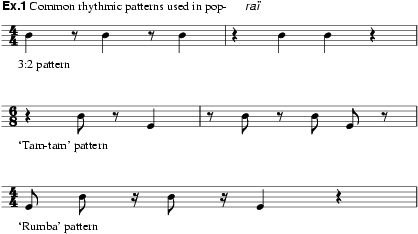
A genre of North African popular music, most closely associated with the city of Waharan (Oran) in western Algeria and nearby towns on both sides of the border with Morocco.
The earliest music of this name was performed by female singers in the bars of Oran during the 1920s and 30s. They were accompanied by the gaspah (an end-blown flute) and the guellal (a pottery, single-headed cylindrical drum). During this period of French colonial rule Oran was a busy port, largely inhabited by Europeans and surrounded by bidonvilles, the homes of dispossessed Arab migrants. This mix of peoples and cultures gave rise to an entertainment business which appropriated elements of the sexually frank medhatte repertory, moving it from its traditional place at single-sex wedding parties into a public and morally ambiguous context.
Cheikhat (female equivalent of cheik, ‘elder’) performed songs which expressed passion, powerlessness and lamentation and also included elements of local religion. These themes traditionally belonged to a discrete female repertory. The presentation of these topics to a mixed audience and the boldness of the singers themselves were widely condemned by a local Arab community striving to present a morally superior identity in opposition to that of European colonialists.
Following regional traditions, the music of early raï typically included repeated phrases and sung lines alternating with passages played on the flute. The range was limited to that of the gaspah but emphasis was placed on a timbre of sensual hoarseness. The guellal maintained a steady rhythmic pattern throughout the performance, typical of other local genres derived from dance or religious practices. This early style gradually absorbed influences from further waves of Moroccan, Saharan and Berber immigrants to the city, before and after independence in 1962.
Until the 1970s, because of the dubious moral associations of raï, performances were usually limited to semi-public domains such as men's bars, bordellos and wedding parties. Singers such as Cheikha Rimitti and Cheikha Djennia often added wry and witty comments to songs and dedications were often made to members of the audience who gave money to the singer's berrah (master of ceremonies).
With the arrival of cassette technology and a period of relative political calm in the late 1970s, raï recordings began to be produced for local consumption. There was considerable experimentation in the recording studios and gradually the genre incorporated novel regional and global musical elements. Early pop-raï recordings, such as those by Messaoud Bellemou, show relatively little change to the melodic patterns and tonal range. However, an improvised introduction in free rhythm was appropriated from either andalouse or Egyptian traditions and a version of the tam-tam rhythm was included from the wedding musics of the Moroccan border (ex.1). The songs themselves reworked familiar local material, often referring to specific places in Oran itself. Singing in Darija, the local dialect of Arabic, pop-raï singers adopted the title ‘Cheb’ (female, Cheba), meaning ‘young’, which defined their main audience and distinguished them from an earlier generation of singers. The production of such a linguistically and musically syncretic genre as raï, combined with its already immoral associations, offended many Algerians. Nevertheless, the music became increasingly popular at wedding parties (see illustration) and in the nightclubs that dotted Oran's corniche. The recordings of Houari Benchenet, Cheb Khaled, Cheba Zahouania and Cheb Hamid typify the music of this period.

Despite the lack of dissemination by the radio, raï thrived throughout the 1980s, in part because of the interest of expatriate Algerian communities and the broader world music market. Raï reflected this increasing globalization by the inclusion of reggae and funk influences, Western harmonic progressions and chorus structures drawn from Western popular styles. At the same time, it was equally affected by the Egyptian and Moroccan popular cha'abi styles. Many of these genres were already popular in Algeria, but such a development highlighted a growing cultural dilemma facing Algeria at the start of the 1990s.
As political opponents of the single-party (FLN) state rallied around radical Islamic alternatives, so views on issues such as language, music and traditional gender roles became polarized ideological positions. Algeria entered a protracted cultural civil war after the government cancelled elections in 1991, and many raï performers (among other musicians, writers and artists) were intimidated into silence or emigration. Several were abducted or killed, including the producer Rachid Baba and the ‘king’ of ‘romantic raï’ Cheb Hasni.
By the end of the 1990s raï had developed in various ways. Outside Algeria Khaled has become internationally famous, and Cheb Mami and Cheb Sahraoui have also forged successful expatriate careers. In the process much of the music lost any of its distinctive local characteristics, although it was still sung in Waharani Darija. In Oran local tastes and political circumstances have constrained experimentation, but raï has remained very popular, particularly the performers Cheb El Hindi, Cheb Nasro and Cheb Fathi. The raï performed just over the Moroccan border in the town of Oujda, by Mohammed Ray, Mimoun el Oujdi and Les Frères Bouchenak, continues to blend elements from the raï of Oran with European and local forms.
See also Algeria, §1(v).
M. Virolle: La chanson raï (Paris, 1995)
D. Bouziane and H. Miliani: L'aventure du raï (Paris, 1996)
T. Langlois: ‘The Local and Global in North African Popular Music’, Popular Music, xv/3 (1996), 259–74
M. Schade-Poulson: Men and Popular Music in Algeria (Austin, TX, 1999)
Hada raykoum, perf. Khaled, Triple Earth (1985)
Le prince du raï, perf. Cheb Mami, Sonodisc MLPCD 1300 (1986)
Raï Rebels, various pfmrs, Earthworks 1-91000 (1988)
Le père du raï, perf. M. Bellemou, World Circuit WCD 011 (1989)
Hana hana, perf. Cheb Fadela and Cheb Sahraoui, Uni/Mango 9856 (1990)
Les racines du raï, perf. Cheikha Remitti, Buda Musique 828742 (1996)
Sahra, perf. Khaled, Uni/Mercury/Polygram B00000 1EZ1 (1997)
TONY LANGLOIS